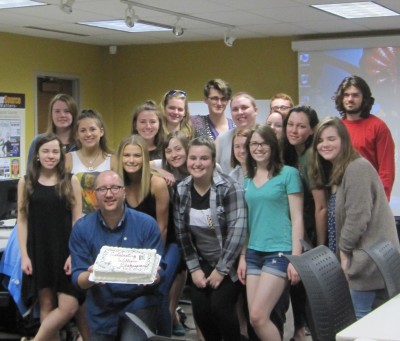Rhodes Scholar Billy Rathje ’15 nominated Wesley for the inaugural award; Letter arriving from Oxford is a “surprise” and “honor.”
TACOMA, Wash. – For many hours, Professor John Wesley sat in his office endlessly discussing Medieval and Renaissance literary ideas with his student Billy Rathje ’15.
But it was only when Rathje became Puget Sound’s third Rhodes Scholar last year and headed off to the University of Oxford to explore the world of computer science that the associate professor of English learned just how much those sessions meant.
Last month Wesley found a British-postmarked letter from The Rhodes Trust in his campus mailbox. He opened it and found that he had been named an inaugural Rhodes Trust Inspirational Educator.
“I was very surprised,” Wesley said about the congratulatory letter and purple-sealed certificate. “I’m honored, of course, and Billy’s nomination means a lot to me. He’s a remarkable person who is doing great things.”

The new Rhodes Trust Inspirational Educator award, which aims to “highlight the incredible teaching which occurs throughout the world,” was the result of a long nomination letter from Rathje that illustrated, in its deeply thoughtful language and a profusion of detail, just how far Rathje has come as a devotee of English literature—and, just how much Wesley’s “anything but boring” classes and those long office conversations had meant to Rathje.
The congratulatory letter from Charles Conn, Warden of Rhodes House, explained that Rhodes Scholars had been invited to nominate those teachers or professors who had had the most profound influence in their lives. It ended with the comment, “The power of friendship, creativity, and a commitment to service should not be underestimated, even in a world where the challenges are manifold. Thank you for your part in this.”
A few excerpts from Rathje’s nomination letter follow:
“Throughout high school, I had been turned off from studying English literature due in part to a series of courses in which my papers and exams faced consistent criticism. … I assumed that I didn’t “get” what it took to study English and thus gravitated toward the sciences.
“I signed up on a whim for John Wesley’s Medieval and Renaissance English course. … That course changed the trajectory of my work in college.
“I spent countless hours per term discussing literary theory, literary ideas, and essay topics with Professor Wesley. He never seemed in a rush to make time for his own work. … He noted when I came up with something he thought was original. Mid-sentence, he’d flip through a book, knowing the exact pages I was referencing, eager to identify something in the verse I’d pointed out that he had never noticed. He was fair in pointing out when my ideas weren’t yet developed. … Importantly, he gave me confidence in asserting my own intellectual voice.
“Students flocked to his classes because Professor Wesley acknowledged the humor and humanity in Renaissance literature on its own terms, enlivening literature in what can be an archaic language for a contemporary audience of students without ever making it too contemporary. … His teaching was riddled with jokes and irony, his manner larger-than-life, but his courses' rigor and focus were a top priority, and students I studied with left classes debating the issues long after. …
“He placed his students above everything else, and he genuinely valued dialog. … He is the type of teacher people speak of when they allude to master educators, but the kind few people ever have the fortune to encounter.”
Wesley was both a teacher and faculty advisor to Rathje, a Lake Oswego, Ore., native who came to Puget Sound on a Lillis Scholarship. Wesley encouraged Rathje to apply for the Rhodes Scholarship. He shared his own experiences with the British education system, based on his time earning a doctoral degree from the University of St Andrews in Fife, Scotland.
John Wesley joined Puget Sound in 2011 from the University of Toronto, where he researched and taught with support from an Andrew W. Mellon Postdoctoral Fellowship. He teaches upper-level courses on Shakespeare, Milton, the Bible, and literary traditions, history of the English language, medieval and Renaissance literature, and 16th- and 17th-century literature, among other things. Wesley’s work has been published in Renaissance Quarterly, Review of English Studies, Renaissance Studies, Oral Tradition, and Notes and Queries.
Press photos of John Wesley are available upon request.
Photos on page: From top: John Wesley, by Terri Gonzalez; John Wesley's class, A Year in the Life of William Shakespeare, celebrates the 400th anniversary of Bard's death.
Tweet this: John Wesley @univpugetsound named an inaugural @Rhodes_Trust Inspirational #Educator. Nominator: @BillRathje #highered #totheheights
Follow us on Twitter! twitter.com/univpugetsound